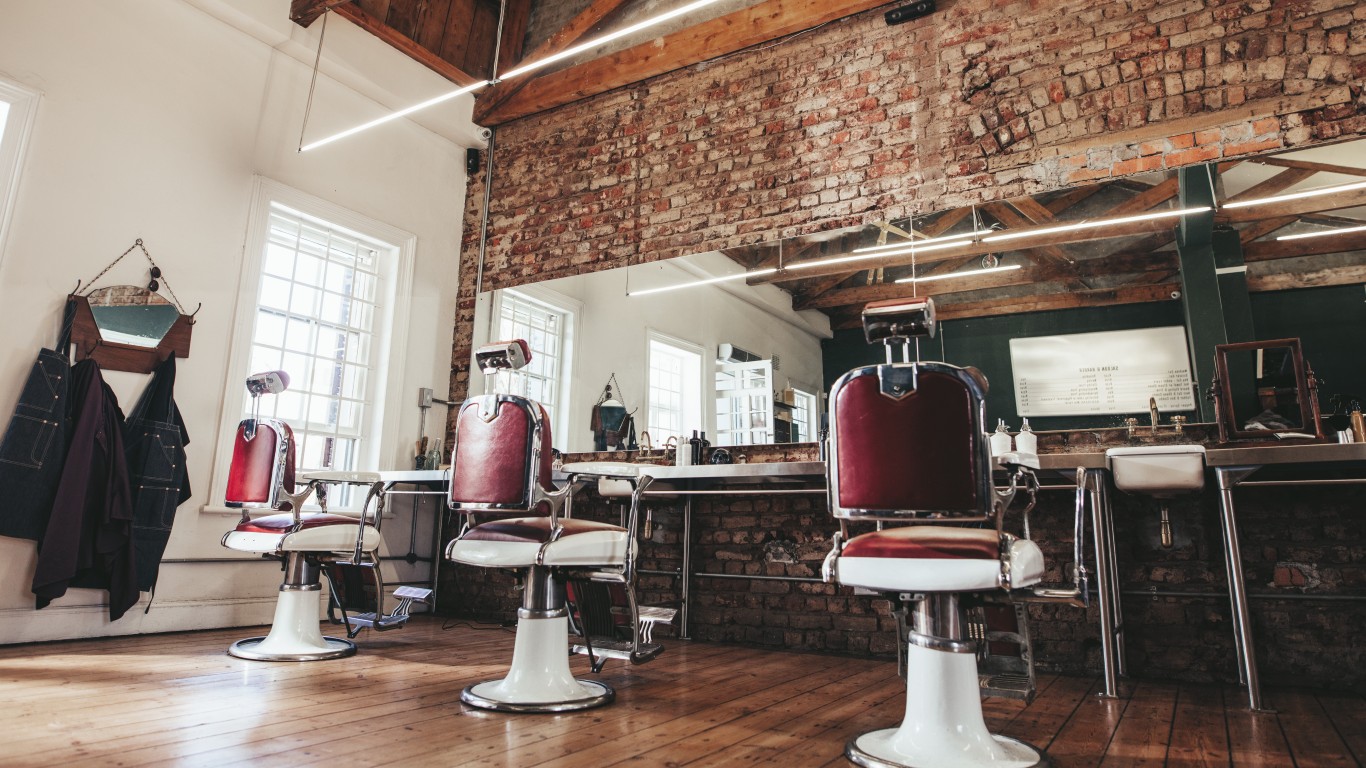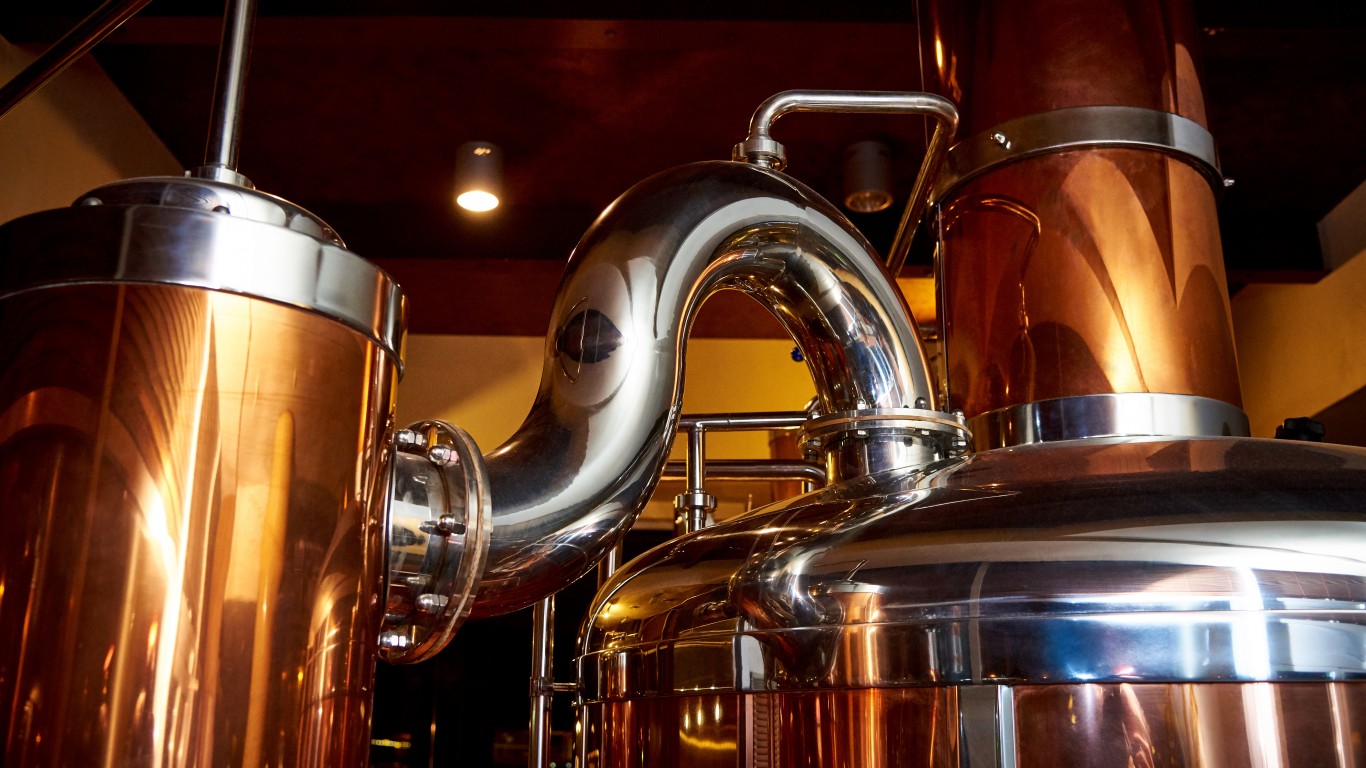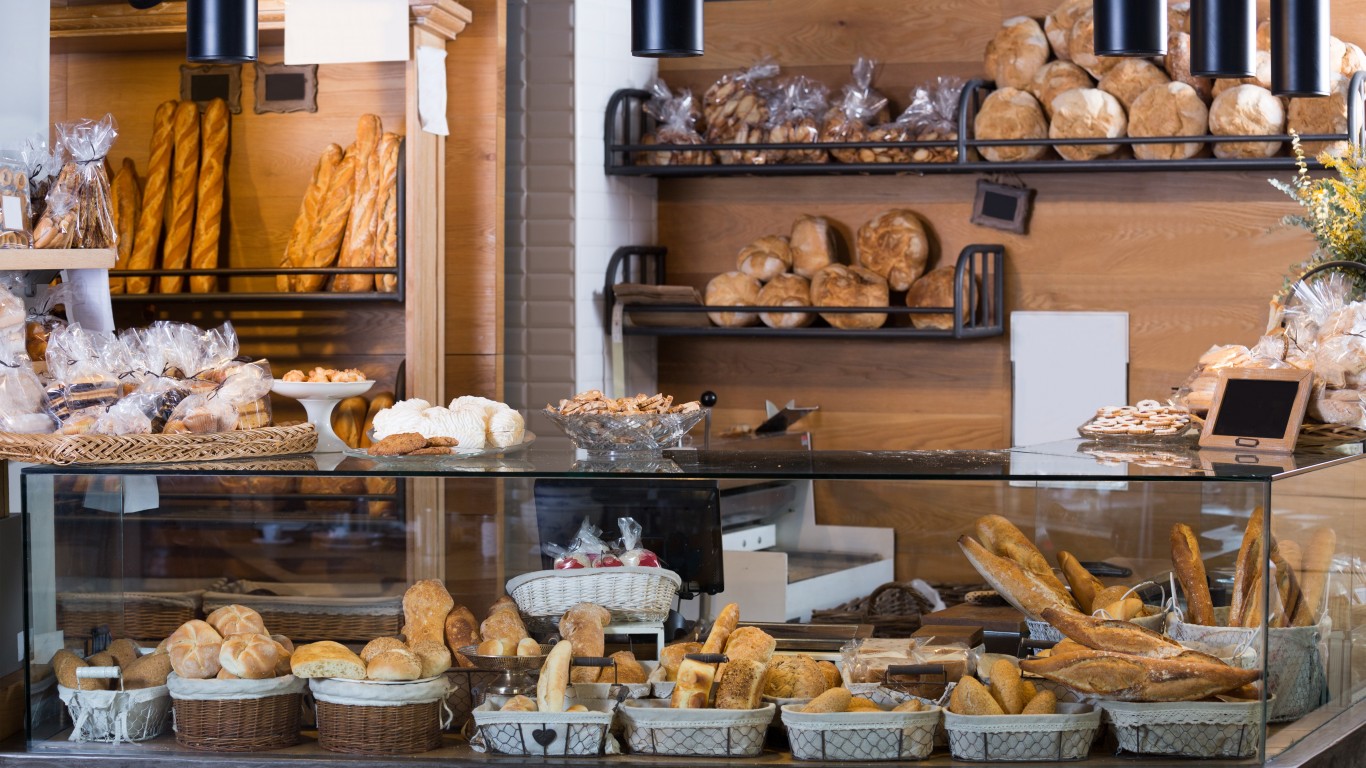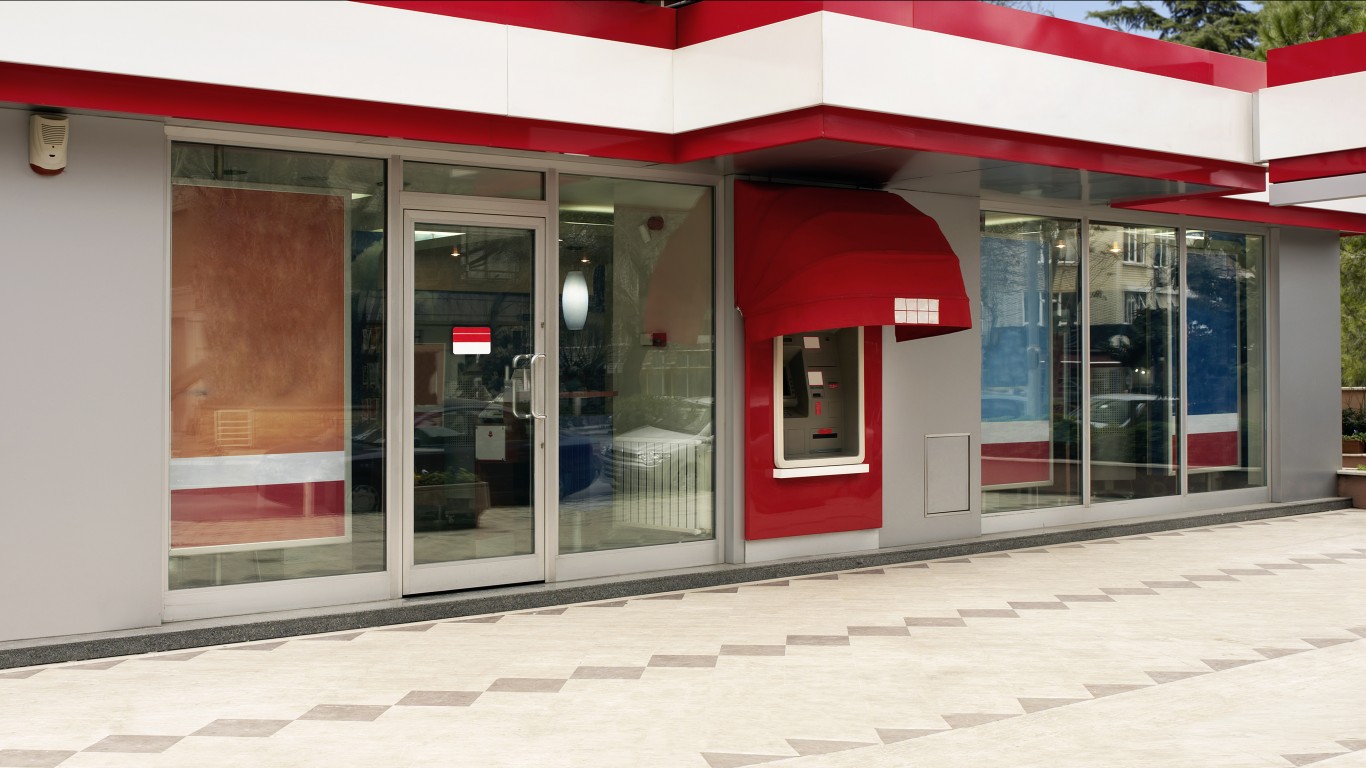Special Report
Which Small Businesses Need the Most Help During the COVID-19 Crisis

Published:

7.5 million small businesses are at risk of closing permanently in the wake of the coronavirus pandemic, according to a recent survey. Small businesses employ nearly half of the U.S. workforce and are especially vulnerable to economic downturns as they lack the capital of larger companies.
In the most recent attempt to minimize the economic damage, Congress, on April 23, passed a bill that will provide $310 billion in aid to small businesses struggling to survive during the COVID-19 crisis. The latest legislation brings the total government stimulus spending aimed at bolstering the economy in the wake of the crisis to an unprecedented $2.5 trillion.
In light of the historic government relief spending, 24/7 Wall St. compiled a list of the types of small businesses that need the most help during the coronavirus crisis. Our list includes the self-employed and sole-proprietors (who work for themselves or through a larger company like Airbnb) to businesses with several hundreds employees in a range of industries.
Part of the government assistance program for small business aims to assist companies with fewer than 500 employees with payroll costs. With this help, companies that are struggling with reduced revenue will be less likely to have to lay off workers. So far, unemployment claims in the last five weeks have wiped out all of the employment gains of the last 10 years. Here is a look at every state’s unemployment claims since COVID-19 shut the economy down.
While no sector of the economy has been unaffected by the efforts to contain the spread of the coronavirus, businesses in certain industries are especially exposed. These include food and beverage services, hospitality, and travel. Here is a full list of the U.S. industries being devastated by the coronavirus.
Click here to see which small businesses need the most help during the COVID-19 crisis.

1. Barber shops
As barber shops are not considered an essential service and can only provide their services at close contact, they were shut down, often by statewide stay-at-home orders. Though Georgia will allow barber shops to reopen on April 24, nearly all other such shops across the U.S. will likely remain shuttered for an indeterminate amount of time. Several Georgia barber shop owners said they will not reopen their businesses until they could guarantee the health of their clients. Even after restrictions are lifted, there are concerns that customers may be reluctant to return to these businesses and be in close contact with hair care professionals.
[in-text-ad]
2. Florists
Few businesses have been impacted by the coronavirus like florists. As events like weddings, Easter services, and proms have been canceled, the demand for flowers has wilted, and many shops were forced to close in states where nonessential businesses have been ordered to cease operations. Florists have also been unable to get certain types of flowers from overseas due to coronavirus-caused disruptions in supply chains.
3. Tour guides
Areas with economies that rely on tourism were forced to encourage would-be travelers to stay home in the early days of the pandemic. As tourists eventually began staying home and nonessential travel all but ceased, it became apparent that the industry would lose billions of dollars. Independent guides have seen their revenues almost completely disappear. For guides in certain areas like New York City, the pandemic hit at one of the worst possible times of the year. Tour guides often get the bulk of their work during the spring and fall, when the weather is pleasant.

4. Ski resorts
Ski resorts are one of many nonessential businesses forced to shut down across much of the country as states have instituted measures to contain the spread of COVID-19. At these resorts, the vast majority of business is seasonal, and closures in March eliminated some of the busiest days of the year. In some parts of the country, particularly in the Colorado Rockies, ski resorts are the economic backbones of entire communities.
Vail resort in Colorado is currently facing a class action lawsuit for its early closure and failure to provide refunds for season pass holders.
[in-text-ad-2]

5. Event hosts
Even before the Centers for Disease Control and Prevention advised against gatherings of 50 or more people on March 15, the writing was on the wall for the concert industry. In Austin, Texas, officials on March 6 cancelled the city’s iconic annual South by Southwest, or SXSW, music festival scheduled to begin a week later. The festival’s full-time and seasonal workers had an economic impact of over $350 million on the local economy in 2019. Coachella, the music and arts festival held annually in Southern California was postponed by six months on March 10. These are only two examples of countless events that have been postponed or cancelled over coronavirus fears.
Not only do the cancellations and delays hurt the businesses involved in putting on the festivals, but also small businesses from bars, restaurants, and hotels surrounding these events and venues are all losing potential revenue.

6. Airbnb hosts
Airbnb hosts derive income by listing rooms or properties for rent on the platform. There are about 660,000 listings in the United States. With all nonessential travel effectively on pause, hosts across the country are losing revenue that they rely on. As early as March 20, the company reported a 50% decline in domestic bookings.
The company recently announced plans to compensate hosts for some share of lost revenue. However, many have yet to receive payment and many of those who have say the payments are negligible. Some have reported receiving payments that amount to tens or hundreds of dollars, well below the thousands they are losing.
[in-text-ad]

7. Local news outlets
Even though amid the COVID-19 pandemic the public is turning more to local news outlets to find out about the situation in their communities, including hearing from local and county officials, smaller media organizations are struggling. This is partially because the local businesses that would typically advertise during newscasts or in newspapers can no longer afford to do so. Despite trying to provide a most essential service at this time, these news outlets have struggled, and some have been laying off workers, including journalists. This has had an impact on thousands of journalists from all across the country. The New York Times calculated that 33,000 workers at media organizations have lost their jobs or had their pay cut since the pandemic hit.

8. Independent restaurants
The restaurant industry has been among the hardest hit by social distancing and shelter-in-place orders. Before the pandemic, an estimated 15.6 million people nationwide worked in restaurants, many of which are small, family owned, independent establishments.
According to industry advocacy group the National Restaurant association, 30,000 restaurants — or 3% of all restaurants nationwide — had permanently closed due to the coronavirus as of the beginning of April. The same group predicted that permanent closures would total 11% of U.S. establishments by the end of the month. Analysts at UBS, an investment bank, predict that by the time the economy may finally reopen, 20% of all U.S. restaurants will have closed permanently because of the pandemic.

9. Independent gyms
The fitness industry, a $94 billion behemoth, is facing greater disruption than most in the wake of the coronavirus pandemic. Small, independent gyms and larger national chains alike are doing what they can to stay afloat, as customers who are under orders to stay at home have been cancelling their memberships. Many gyms are offering virtual guided workouts for members to stream or tune in live from their computers. Meanwhile, sales of at-home fitness equipment have been skyrocketing.
[in-text-ad-2]

10. Dental offices
The American Dental Association recommended on March 16 that dentists cease checkups and routine care and offer only urgent and emergency care. This has created a unique challenge — as dentists offices that remain open for emergency care still need to pay their staff, but have significantly less revenue to do so.
Dentists are lobbying for the ability to give on-site COVID-19 tests to patients because they face an increased risk of exposure to the virus as they work in patients’ mouths. In addition to the lost revenue, dentists are concerned that some patients may be forced to wait until their dental issues become emergencies and then go to a hospital emergency room, which could take up valuable resources.
11. Laundromats
In much of the country, businesses that have been deemed essential are forced to limit the number of people who can enter their establishment — and this has spelled financial disaster for proprietors of laundromats. As fewer Americans are going into work, laundromats have been hit especially hard by reduced demand for dry cleaning services, which typically makes up a considerable share of their revenue. Some independently-owned laundromats in New York City were reporting a 50% reduction in business as of early April.
[in-text-ad]

12. Craft brewers
Throughout the 2010s, craft brewers enjoyed a surge in popularity, but sales have been lagging during the pandemic. Although Nielsen data is showing that Americans are drinking much more while social distancing, craft beer sales have cratered. The Brewers Association, a craft beer organization, surveyed over 500 American independent brewers about the state of their businesses. On-site sales dropped by an average of 65%, while distributions have nearly stopped altogether, falling by 95%, according to the respondents.
While some brewers have been able to distribute beer either through deliveries or pickups, they have nearly lost much of their main source of revenue — on-site beer sales. Most respondents also said they would not be able to survive more than three months in these economic conditions, and most Americans who worked in craft breweries before the pandemic have already been laid off.

13. Taxis
Taxi drivers, who have already struggled to compete with companies like Lyft and Uber, now face yet another hurdle brought on by COVID-19. As nonessential travel has halted across much of the country, demand for taxi services has plummeted. As of late March, taxi ridership cratered by more than two-thirds in New York City. One New York cab driver reported only three rides in as many days.
According to one survey of seven New York cab drivers, the average revenue for the week ending March 21 was only $368, a fraction of the $1,260 average from two weeks prior.
14. Dog groomers
Pet care businesses fall in a grey area of what is allowed to remain open and what is not in much of the country. In states like Ohio and Pennsylvania, dog groomers are explicitly prohibited from opening. In other states, like New York, dog groomers have been making the decision for themselves, some staying open arguing that regular grooming can be essential to pet health, while others temporarily shuttering operations. The $9 billion in revenue pet grooming and boarding businesses typically bring in annually in the United States will likely be reduced substantially this year.
[in-text-ad-2]

15. Bars
As bars across the country have shuttered to prevent the spread of COVID-19, the revenue plunge has left many with uncertain futures. Some establishments have set up GoFundMe pages to stay afloat. Mass closures will have a substantial impact on the country’s unemployment crisis as restaurants and bars rank among the largest employers in the United States. If Italy’s predicament is any sign of things to come, the Mediterranean nation might reportedly see 50,000 bars and restaurants permanently close due to the virus.

16. Wildcatters
Wildcatters are independent exploration workers who seek out new locations to drill for oil and natural gas. They face an unprecedented challenge as oil prices plunged to negative territory for the first time in history on April 20, with demand falling and Russia and Saudi Arabia launching into a price war and flooding the market with oil. While larger oil and gas companies will likely be able to weather the storm, smaller companies may struggle to survive.
[in-text-ad]

17. Independent movie theaters
Just as major theater chains like Regal and AMC have shuttered thousands of cinemas across the country, smaller theaters that show independent films have also closed. While larger theaters could declare bankruptcy and still emerge after the pandemic, smaller cinemas may not have that option. Some theaters have offered virtual cinemas, selling passes for viewers to stream films online but with the abundance of streaming options at home, this option will likely not come close to regular ticket sales. Independent theaters may struggle for a long time to come as film production has largely stopped. Even when theaters eventually reopen, there will likely be a gap in new films being released to draw moviegoers back to the theaters.

18. Personal trainers
Just as gyms are taking a financial hit during the pandemic, so are personal trainers. Trainers, who typically work in a gym or the clients’ homes to help the clients reach specific fitness goals, can no longer go to work in much of the country due to stay-at-home orders. While many personal trainers are still able to do their job by offering virtual sessions, they are facing increased competition from other trainers and celebrities offering virtual workout classes at no cost. According to Facebook, the number of home workout posts were five times higher on Instagram than usual on March 18.

19. Wedding vendors
The wedding industry is a $74 billion behemoth that directly supports an estimated 400,000 businesses. These include florists, wedding planners, caterers, DJs, and photographers, among many others. Couples across the country have postponed their big day, leaving wedding vendors scrambling to guess when weddings can be safely held once again. This has left wedding vendors without any revenue this spring.
[in-text-ad-2]

20. Truckers
The trucking industry was already in decline heading into 2020, and with lost revenues from the coronavirus, many smaller companies in the sector could go bankrupt. As essential businesses, trucking companies have been able to keep operating, though there are not always enough goods to fill the trucks. While food, medical supplies, and consumer goods are in high demand, businesses that haul retail goods or autos are struggling. From the last week of March to the week ending April 19, demand for trucks for hauling goods fell by 68% — to the point where there were more trucks available than there were loads that needed to be hauled.

21. Bakeries
Many people are turning to new hobbies while staying at home, and one of the most common hobbies people are trying is baking anything from bread to pizza doughs to pastries. This may come at the expense of bakeries. Yeast and flour are becoming hard to find in some grocery stores, and bread making machines are selling out from online stores. Bakeries across the country have reported declining revenues, and many have had a difficult time accessing funds from the Congress Paycheck Protection Program.
[in-text-ad]

22. Freelance journalists
As news outlets across the country are cutting their budgets in the face of declining advertising revenue, freelancers are often the first on the chopping block. Unlike full-time employees, freelancers work from one assignment to the next and typically do not have benefits like health insurance coverage. However, thanks to newly passed legislation, freelancers are now eligible for unemployment benefits.

23. Community banks
Community banks, which had already been suffering in the years leading up to the coronavirus, losing business to bigger banks, are among the small businesses that will likely take a hit financially because of COVID-19. Community banks, typically classified as those with under $10 billion in assets, will likely see a reduced demand for loans in the near future as the U.S. economy slows. Additionally, as more businesses fail and are unable to repay loans, small banks may be forced to take the loss.

24. Artists
The career outlook for artists is highly dependent on the economy as people typically only buy art when they have disposable income. With the economy at a standstill, the demand for artwork from individuals and businesses could become virtually nonexistent. Museums and galleries are remaining closed as they are nonessential businesses. Many artists are freelancers and may have to rely on charitable resources provided by patrons of the arts.
[in-text-ad-2]

25. Architecture firms
Many future construction projects are on hold, either because they are nonessential or because companies are holding off on new buildings until the economy improves. With projects being canceled, small businesses that are often contracted for these projects are being hit especially hard and may have to turn to furloughs and layoffs to keep afloat.
A March survey from the Society for Human Resource Management found that about half of businesses with fewer than 100 workers would not be able to afford to pay all employees after a month under quarantine. Architecture firms often do not have many employees — more than 93% employ fewer than 50 people, according to a 2018 survey from the American Institute of Architects — and they will likely be among small businesses suffering most.
Ever wanted an extra set of eyes on an investment you’re considering? Now you can speak with up to 3 financial experts in your area for FREE. By simply clicking here you can begin to match with financial professionals who can help guide you through the financial decisions you’re making. And the best part? The first conversation with them is free.Click here to match with up to 3 financial pros who would be excited to help you make financial decisions.
Thank you for reading! Have some feedback for us?
Contact the 24/7 Wall St. editorial team.